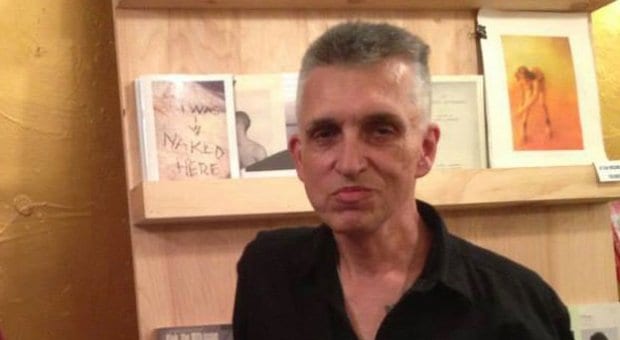“I didn’t know that they gave away awards for being bisexual,” a Canada Border Services guard sniggered.
“Only if you’re really good,” Basil Papademos retorted.
Papademos, apparently, is really good. The Toronto-born, Thailand-based writer won the award for Best Erotic Fiction at the first-ever Bisexual Book Awards. The border guards, however, didn’t seem to appreciate his talent. He was detained for more than eight hours while he was being interrogated, as his literary wheelhouse, apparently, risked contravening Canada’s rarely enforced obscenity laws — rare, that is, unless you’re trying to cross the border.
Papademos was on a train, heading from New York to Montreal. When they reached the border, he and his seatmate — a part-French, black rapper who crosses the border often and faces this every time, he mentioned — were singled out for attention. The guard looked at Papademos’s passport and, as the writer puts it, once the guard noticed the Thai stamp, “they got immediately suspicious.”
Papademos was pulled off the car and led into a shack, in the middle of nowhere. There, one guard — wearing blue plastic latex gloves and clad in the Canada Border Services Agency (CBSA) uniform, which is a bulky set of armour and holsters for the sidearm, pepper spray and handcuffs — began riffling through his things.
“It was really kinky,” Papademos grins, sipping on a half-pint of beer in Montreal’s Plateau neighbourhood.
The first thing the guard pulled out, Papademos says, was the “bowling trophy” of an award, which he held “like a used condom.” He says the guard grimaced. “What’s a gentleman like you doing getting involved with . . .” he pauses, “this.”
Papademos, cheekily, said, “I resent the implication that I’m a gentleman.”
But the guard went on. Next he pulled out the author’s book and leered at the cover — the covered-up image of a “ladyboy,” as Papademos calls her, who graces the front of Mount Royale. He leafed through it, then put it down.
At that point, the guard was suspicious and Papademos’s sass didn’t help the situation. After opening his laptop and coming across some photos from the author’s old haunts in Thailand — “ladyboy bars,” he says — the guard decided that Papademos was not getting back on the train. He packed him into a squad car and sent him to the nearest border crossing, at Lacolle, Quebec. There, the guard explained that would be running special software to search his two laptops and his iPhone for illicit material.
The guard read over the part of the Customs Act that permits CBSA to search computers. “Do you understand?” the guard asked. Papademos confessed he didn’t, and they engaged in a back and forth until the writer gave a satisfactory answer.
Papademos accepts readily that he has a lot of explicit pictures on his computer. But he says that he knows everyone in the pictures, and they’re all of age.
His book, certainly, would be considered “obscene” by CBSA standards. Papademos thinks it over when asked what sort of potentially lawbreaking material could be in the book. “Fisting,” he nods. The villain in the novel, too, runs a child sex ring atop Mount Royale, which Papademos notes is semi-historical — the book is a “love letter to Montreal,” and circa the 1980s, when the book is set, the city was “filthy.” And the city’s iconic mountain was the site of much of it.
Just the same, it was his electronics that the border agents confiscated. The guard, apparently, couldn’t find the software and had to send it to Ottawa for review, where it could be held for as long as three months. After that, he would be charged for whatever, if any, illegal material was found on them.
Papademos was eventually given a chance to speak to a legal aid lawyer, who told him that CBSA had completely neglected the normal guidelines. She vowed to fight the infringement.
Papademos was released, after eight hours, and was stuck in the middle of nowhere. Luckily, he caught a ride with three Haitian Montrealers also leaving the inspection area. They told him they get stopped every time they cross.
Papademos got a phone call three days later from CBSA. He was informed that he was all clear, and there was no evidence of anything illegal. He could pick up his computers and iPhone at the border.
Xtra contacted the CBSA to ask if Papademos’s experience was normal, or even permitted under their guidelines.
A spokesperson told Xtra that “a number of risk-based indicators guide officers in making the decision to refer goods and individuals for further examination or investigation.”
The spokesperson confirmed that the agents can detain goods based on speculation and examine them for contraband material but notes that if the suspect material is prohibited as obscenity, the importer will receive a written notice of determination “that includes the reason why their goods were being confiscated.” Papademos didn’t get that. The spokesperson went on to say that if the goods were determined to be clean, they would be returned with a letter explaining the situation. When the Toronto-born writer got his computers back, they came in a plastic bag with no writing or identification it. Then he was on his way.
If the guard had had any reason to believe that there was child pornography on his computer, the guidelines are clear — Papademos would have been arrested then and there.
While Papademos got off this time, if the guard had felt like it, Mount Royale almost certainly could have been tagged and bagged as unfit for import into Canada. Had he followed the normal procedure, he may have been able to keep the writer’s computers as well.
The nebulously defined Section 163 of the Criminal Code, and its corresponding section of the Customs Act, reads that it is illegal to transport, produce, distribute or own “any publication a dominant characteristic of which is the undue exploitation of sex, or of sex and any one or more of the following subjects, namely, crime, horror, cruelty and violence, shall be deemed to be obscene.”
Mount Royale certainly checks off more than one of those boxes.
Papademos is more than familiar with his sexuality being the target of police scrutiny. He’s been at the receiving end of a police baton before while being called “faggot.” He recalls one time, when he was caught in a Toronto police bathhouse raid, the police “would tuck their pants into their socks,” to protect themselves from the filth they imagined was swimming in the place.
In the end, Papademos isn’t going to file a complaint. He figures if the complaint gets him red-flagged, he’ll be facing the same trouble as the Haitian Montrealers or the black musician. He just wants to cross the border.
Check out two more stories in Xtra‘s series on border issues:
Trans photographer alleges mistreatment at Canada-US border
Charge against Magnotta snuff video website owner raises questions about freedom of expression


 Why you can trust Xtra
Why you can trust Xtra


